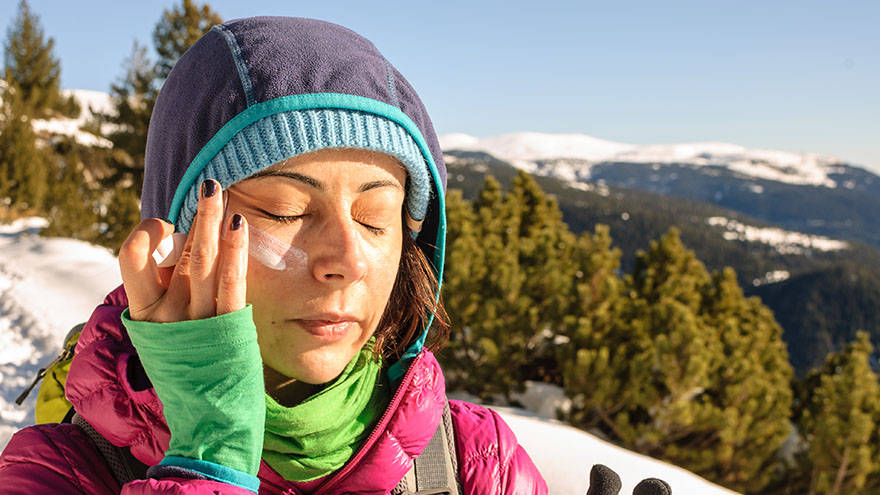Search
-
5 Easy Winter Skincare Tips
Winter skin alert – cold temperatures can put your skin into chaos. We asked for skin tips from Heidi Nicol, an esthetician with Renown Dermatology, Laser & Skin Care. She shares how to keep your skin glowing through the frosty months ahead. 1. Re-think your shower Few things feel better on a cold day than a long, hot shower. But hot showers can lead to dry skin because they strip your skin of its natural protective oils. Avoiding them altogether is best – choose a lukewarm, or warm, shower instead. If you have an occasional hot shower, the American Academy of Dermatology (AAD) suggests keeping it at five to ten minutes. Nicol recommends using a gentle cleanser and avoid using too much. Moisturizing after a shower or bath while your skin is still damp is also a must. Slathering on your favorite lotion helps your skin hold on to precious moisture. 2. Stay away from smoke and fire Although sitting close to a roaring fireplace can feel good, it is drying to your skin. Smoking and exposure to smoke also harms your skin. Smoking reduces healthy blood flow to the skin. This also causes your skin to wrinkle faster, making you looker older. Additionally your skin heals much slower if you smoke. 3. Consider a humidifier Cranking up the thermostat dries out indoor air. Skin is our largest organ, and in general, heat is very drying to your skin. To clarify, over time dry air degrades your skin’s natural moisture (lipid) barrier leading to flaking, peeling and cracking. Your skin can overcompensate for the dryness by producing even more oil. In other words it is possible for your skin to be both oily and dehydrated at the same time. Even oily skin needs a daily lightweight, non-pore clogging moisturizer. 4. Use SPF daily The sun’s rays damage your skin even on cloudy days. Sunlight contains UVB (burning) and UVA (aging) rays. Although UVB rays are less strong in the winter, the UVA rays are same strength all year. And snow can reflect almost 90% of UV radiation. With this in mind make sure you have suitable skin and eye protection when going outdoors. 5. Take care of your hands and feet Don't forget your fingers and toes when moisturizing. These areas tend to be drier than other parts of the body. Gloves help to protect hands from winter weather and lock in moisture. Similarly, putting lotion on your feet before your socks will keep them your skin from flaking and cracking. Follow the tips above to make sure your skin is at its best, despite the winter weather.
-
Preventing Skin Cancer A Doctors Tips
Want to protect yourself from skin damage from the sun’s harmful rays? Dr. Angela Walker, dermatologist with Renown Medical Group, shares what you can do to prevent skin cancer. What can people do to prevent skin cancer while enjoying the outdoors? There are several steps you can take to protect your skin from the sun. “I caution all of my patients to avoid the sun during the hours of 10 a.m. until 2 p.m. when UV rays are strongest. I also encourage people to wear sleeves on cooler days. And don’t forget that we still need to wear sunscreen on cloudy days! UV rays can still cause sun damage on cloudy days. Preventing skin cancer also entails wearing sunscreen of at least SPF 30 everyday. Are hats also a good idea for skin protection? Yes, of course! Choose a wide-brim hat that shades the face as well as the back of the neck for extra protection against UV rays. When it comes to identifying skin cancer, what should people watch for? We use easy-to-remember letters when checking for spots on the skin; it’s called the ABCDEs: How often should people go to a dermatologist for a full-body skin check? People with a family history of melanoma or who have already had skin cancer need to be screened at least once a year. Those who are younger and use sunscreen daily don’t need to be seen as regularly. Their primary care provider can do a yearly screening. And remember to do self-screening at home to keep an eye out for unusual looking spots. Is it best to visit a care provider with an expertise in skin with questions or concerns? Absolutely. As a dermatologist, I see a lot of people coming in with a changing mole or brown spot that looks irregular. I can assure them it’s benign or get them the treatment they need. We can even use photography to monitor skin spots and have the patient take photos at home. We also perform biopsies as needed.

